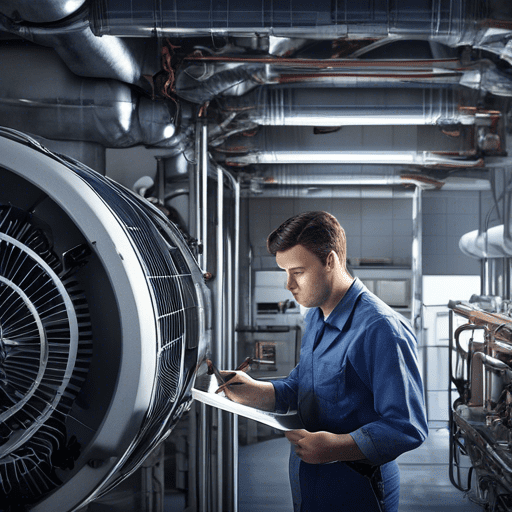Building information modeling, (BIM) is an innovative approach for planning and managing building projects. This collaborative approach enables experts and

Efficiency is a key consideration in HVAC systems, as it directly impacts energy consumption and operating costs. Inefficient systems not only waste energy but also fail to provide optimal comfort levels. HVAC engineering plays a crucial role in enhancing efficiency by employing various design strategies and technologies. By focusing on system sizing, equipment selection, control systems, ductwork design, and maintenance, HVAC engineers can significantly improve the performance of heating, ventilation, and air conditioning systems.
Proper system sizing and equipment selection are fundamental to achieving optimal efficiency. HVAC engineers conduct thorough load calculations to determine the heating and cooling requirements of a building accurately. By selecting equipment with the right capacity, engineers can avoid oversizing or undersizing issues that can lead to energy waste and reduced system performance. A well-sized system operates at peak efficiency, delivering the desired comfort levels while minimizing energy consumption.
Despite the importance of efficiency, HVAC systems often face common challenges that hinder their performance. One such challenge is inadequate control and monitoring. Traditional HVAC systems rely on manual adjustments and fixed settings, which can result in energy waste. Advanced control systems and automation technologies provide precise control and monitoring capabilities. By integrating sensors, smart thermostats, and energy management systems, HVAC engineers can implement strategies such as demand-based ventilation and temperature setback, optimizing energy consumption based on occupancy and outdoor conditions.
Another challenge lies in the design of ductwork and airflow distribution systems. Inefficient ductwork design can lead to pressure drops, air leaks, and poor airflow distribution, resulting in reduced system performance and energy waste. HVAC engineers focus on optimizing the design of ductwork to minimize losses and obstacles to airflow. By ensuring that conditioned air reaches the intended spaces efficiently, energy consumption is reduced, and comfort levels are improved.
To maximize efficiency, HVAC engineers employ various energy-efficient design principles. One such principle is the selection of energy-efficient components and technologies. Variable speed drives and high-efficiency motors, for example, can significantly improve HVAC system performance and reduce energy consumption. These components adjust the system’s operation based on demand, avoiding unnecessary energy usage and providing precise control over heating and cooling.
Another design principle is the integration of renewable energy sources into HVAC systems. By harnessing solar power, geothermal energy, or waste heat recovery, HVAC engineers can reduce reliance on traditional energy sources and minimize environmental impact. These renewable energy systems can supplement the energy required for heating, cooling, and ventilation, further enhancing system efficiency.
Advancements in technology have revolutionized HVAC systems, offering new opportunities for efficiency improvements. One such advancement is the Internet of Things (IoT), which enables interconnected devices and sensors. IoT-based HVAC systems allow for real-time data collection, analysis, and control, enabling engineers to optimize energy consumption based on accurate information. This technology also facilitates remote monitoring and diagnostics, allowing for proactive maintenance and issue identification, further improving system efficiency.
Another technological advancement is the use of machine learning and artificial intelligence algorithms in HVAC control systems. These algorithms analyze historical data and usage patterns to optimize system operation automatically. By continuously learning and adapting, AI-powered HVAC systems can anticipate demand, adjust settings, and minimize energy waste, ensuring optimal comfort and efficiency.
Regular maintenance and system updates are essential to sustain efficiency over time. HVAC systems require periodic inspections, cleaning, and calibration to ensure optimal performance. Preventive maintenance helps identify potential issues before they escalate, avoiding costly repairs and system downtime. Additionally, keeping HVAC systems up-to-date with the latest technologies and software updates is crucial. New advancements often introduce efficiency-enhancing features and improvements, which can further optimize energy consumption and system performance.
Real-world case studies highlight the significant impact HVAC engineering can have on efficiency. For example, a commercial building in New York City implemented advanced control systems and optimized ductwork design, resulting in a 30% reduction in energy consumption and significant cost savings. Another case study involved the retrofitting of an aging HVAC system in a residential complex with energy-efficient components and technologies. This upgrade led to a 40% decrease in energy usage, improved comfort, and reduced carbon emissions. These examples demonstrate the tangible benefits of investing in HVAC engineering for improved efficiency.
Investing in HVAC system efficiency offers numerous benefits beyond energy savings. Improved efficiency translates into reduced operating costs, providing significant long-term savings for building owners and occupants. Furthermore, energy-efficient HVAC systems contribute to a more sustainable environment by minimizing carbon emissions and resource consumption. Enhanced comfort levels and better indoor air quality are additional perks, creating healthier and more productive living and working environments. Moreover, energy-efficient buildings often enjoy increased market value and attract environmentally conscious tenants, further solidifying the value of investing in HVAC system efficiency.
To ensure the highest level of expertise, HVAC engineers undergo specialized training and certification programs. These programs cover various aspects of HVAC engineering, including energy-efficient design principles, system optimization, and advanced technologies. By staying up-to-date with the latest industry knowledge and best practices, certified HVAC engineers can provide cutting-edge solutions to improve efficiency in commercial and residential spaces.
As energy efficiency continues to be a top priority, the future of HVAC engineering looks promising. Advancements in technology, such as IoT, AI, and renewable energy integration, will drive further improvements in system efficiency. HVAC engineers will play a crucial role in harnessing these technologies and implementing energy-efficient design principles to maximize performance and minimize environmental impact. By prioritizing system sizing, advanced control systems, optimized design, energy-efficient technologies, and regular maintenance, HVAC engineers can pave the way for more sustainable and comfortable indoor environments.
About Author
Xhuljo Jakup